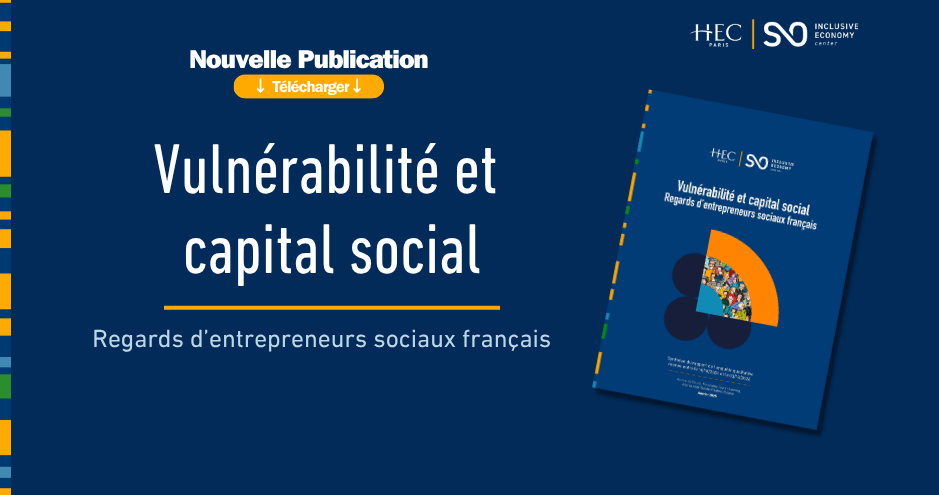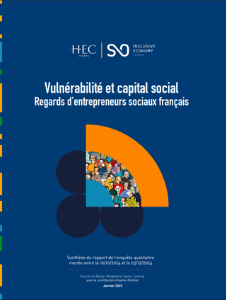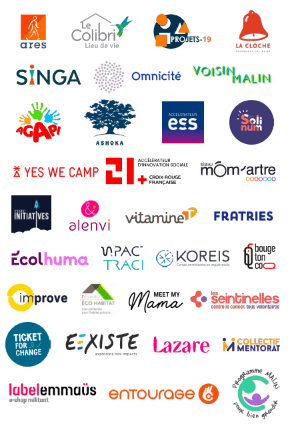HEC Paris Releases a Study on Vulnerability, Social Bonds, and Social Entrepreneurship
As part of its new HOPES research program dedicated to social bonds, vulnerabilities, and social entrepreneurship, the Sustainability & Organizations Institute at HEC Paris unveils the key insights from a qualitative study conducted with 34 French social entrepreneurs, evaluators, and accelerator managers. Carried out between October and December 2024, this research highlights a unanimous finding: restoring social bonds lies at the heart of the real impact of social entrepreneurship.

Vulnerability: A Shared Human Condition and a Lever for Social Action
Far from the usual misconceptions, the respondents emphasize the richness of the concept of vulnerability, seen not as a weakness but as a universal connector that enables genuine human encounters.
This understanding of vulnerability appears as an essential foundation for grasping mechanisms of exclusion, while also fostering empathy, trust, and meaningful support. Social entrepreneurs notably underline the decisive role of isolation—described as “the greatest form of poverty”—in trajectories of increased fragility.
The Structuring Role of Social Enterprises
The study reveals the central importance of connection-building in social innovation projects. Many organizations view themselves as facilitators, creating meeting spaces where shared meaning can be rebuilt: “We are a pretext for creating bonds in everything we do.”
These interactions nurture trust, self-esteem, and relational capacities, which are considered key dimensions of empowerment.
Toward Recognition of Social Capital
Although sometimes perceived as technical, the notion of social capital strongly resonates with observed practices. For some participants, it precisely captures the intended impact: “being able to matter to someone and rely on someone.” This perspective offers new avenues to better qualify the intangible effects of social action.
Weak Signals for the Future of Social Entrepreneurship
The study identifies several structuring challenges:
- Impact assessment, essential but still overly focused on quantitative indicators that struggle to capture what truly matters: trust, life trajectories, restored social bonds.
- Collaboration among actors, deemed indispensable yet still insufficiently supported and funded.
- Scaling up, which proves difficult when impact depends on non-industrializable human relationships.
- A risk of burnout among social entrepreneurs, reflecting broader fatigue within the sector and reminding us of the need to rethink the roles, limits, and responsibilities of social entrepreneurs within the broader architecture of public policy.
Strengthening Bridges Between Research and Practice
Social entrepreneurs express strong expectations toward academia: to analyze transformation mechanisms, develop appropriate measurement tools, and support the dissemination of innovations. Many are eager to welcome researchers into their fieldwork to foster a dynamic of co-construction.
HEC Paris aims to pursue this dialogue between researchers and practitioners to shed light on the challenges of social bonds and strengthen the contribution of social entrepreneurship to social cohesion.
Read the study here [in French]
This study was made possible thanks to the work of Aurore de Belloy and Madeleine Ceyrac Laming, with the contribution from Isaline Rohmer.
We would like to express our sincere thanks to everyone who contributed to this qualitative study. They have added valuable insights to their analysis and enriched the academic.
Here is the list of people who contributed to this study:
Social entrepreneurs and leaders of impact organizations
AGAPI – Karim BECHARA
ALENVI – Léa VEIGA-PLANELLS
ARES – Guillaume HÉRISSON
BOUGE TON COQ – Emmanuel BROCHOT
COLIBRI – Jérôme AUCORDIER
COLLECTIF MENTORAT – Nicolas VIENNOT
ECOLHUMA – Florence RIZZO
ENQUÊTE – Marine QUENIN
ENTOURAGE – Jean-Marc POTDEVIN
FRATRIES – Aurélien L’HERMITTE
LABEL EMMAÜS – Maud SARDA
LAZARE – Timothée BARRE
LA CLOCHE – Louis-Xavier LECA
MEET MY MAMA – Youssef OUDAHMAN
MÔM’ARTRE – Mona HITTI
OMNICITÉ - Célia HANSSEN
PROGRAMME MALIN – Nelly PEREZ
RÉSEAU ECO-HABITAT - Franck BILLEAU
SEINTINELLES – Guillemette JACOB
SINGA – Guillaume CAPELLE
SOLINUM – Victoria MANDEFIELD
VITAMINE T – André DUPON
VOISIN MALIN – Anne CHARPY
YES WE CAMP – Nicolas DÉTRIE
Evaluators
OZON – Hélène L’HUILLIER
EEXISTE – Christelle VAN HAM
IMPACT TRACK – Ricardo SCACCHETTI
IMPROVE – Anne-Laure HERNANDEZ
KOREIS – Adrien BAUDET
Incubators and accelerators
ACCÉLÉRATEUR ESS HEC – Tatjana MARTIC
ACCÉLÉRATEUR 21 – Marielle ZIEDS
ASHOKA – Agnès DE RAUGLAUDRE
PROJETS 19 – Valentin GASNIER
TICKET FOR CHANGE – Joséphine BOUCHEZ

